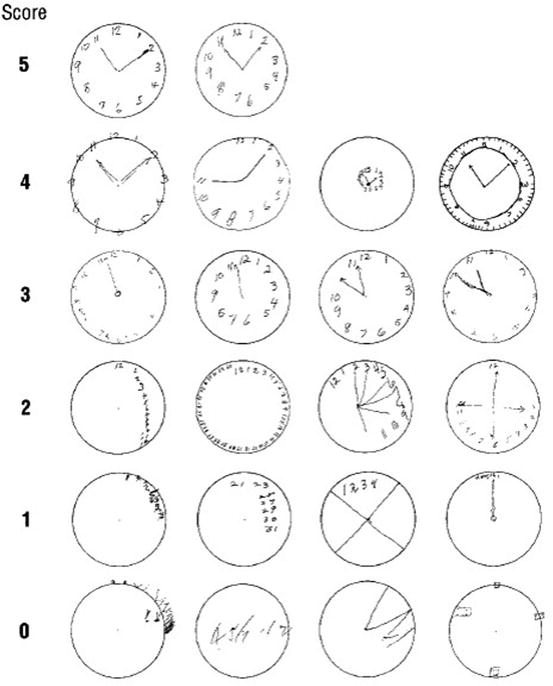Fig. 18.1
Montreal Cognitive Assessment (MoCA) (Copyright Z. Nasreddine MD. Reproduced with permission. Copies are available at www.mocatest.org)
The MoCA test showed excellent sensitivity and specificity in identifying VCI and MCI compared to the MMSE (90 % vs 18 %) [10]. It is recommended that patients who present cognitive complaints and functional decline should first be screened with the MMSE and, if this is normal (>25), with the MoCA test [10]. For patients with cognitive complaints without functional impairment, the MoCA should be administered first, as these patients are either normal or have MCI and may not be identified by the MMSE. A recent study in patients with acute transient ischemic attack and minor stroke found that the MoCA is more sensitive than the MMSE in detecting cognitive impairment at 7, 30 and 90 days after the cerebrovascular event, even when other neurological deficits were not evident [11].
The Clock Drawing Test (CDT) is another cognitive screening instrument which requires a wide range of intellectual and perceptual skills and provides a wide net in capturing cognitive dysfunction [11]. The cognitive domain includes comprehension, planning, visual memory, visuospatial ability, motor programming and execution, abstraction, concentration, and response inhibition [11]. The CDT provides a user-friendly visual record of cognitive function and takes less than 1 min to conduct, which is ideal for busy clinicians. Therefore, the CDT could be used as a complement to the widely used and validated MMSE and should provide a significance advance in the early detection of dementia and in monitoring cognitive change in a few minutes [12] (Fig. 18.2).


Fig. 18.2
Clock Drawing Test. Example of severity scores progressing from 5 (minimum) to 0
A recent study evaluating the cognitive executive function in adult treated hypertensive patients has shown that poor BP control, confirmed by ambulatory blood pressure monitoring, is associated to impaired global cognitive function and especially executive/attention functions [13]. Prose Memory Immediate and Delayed Recall (DR) [14] and Digit Span (DS) Forwards [15] tests were used to investigate verbal long-term memory and verbal short-term memory, respectively. The cognitive domains of attention and executive functions were measured by the DS Backwards test that examines verbal working memory [15], specially affected in patients with white coat effect. This study showed accelerated deterioration of cognitive performances in adult treated hypertensive with an insufficient BP control, mainly in the functions regulated by frontal-subcortical circuits and DR and DS seems to be more specific test in these situations.
In conclusion, screening tests in all or targeted older adults may help identify patients with dementia or MCI who are otherwise missed. Early identification of cognitive impairment would ideally allow patients and their families to receive care at an earlier stage in the disease process, leading to improved prognosis and decreased morbidity. Knowledge of the patient’s cognitive status is important for the management of comorbid conditions, especially in older hypertensive patients, a population in which further specific research is necessary.
18.1 Summary
Microvascular brain damage is a potent risk factor for cognitive decline in elderly hypertensive individuals and for the onset of dementia [1]. In addition to elderly patients, cognitive decline has also been detected in asymptomatic middle-aged hypertensive patients. Therefore, neuropsychological evaluation and neuroimaging are required to assess silent brain damage induced by hypertension and the associated cardiovascular risk factors. With respect to cognitive decline, clinicians should be aware of the high prevalence of microvascular brain damage and make an effort to screen for cognitive function very early in the natural history of the disease and follow-up for cognitive deterioration. Patients with hypertension should be asked during the routine clinical examination whether they have recently experienced changes in memory or mood, speed of thinking and acting, or slowness or unsteadiness during walking. The use of some of the different instruments designed to assess cognitive function and impairment, such as the Mini-Mental State Examination (MMSE), the Informant Questionnaire on Cognitive Decline in the Elderly (IQCODE), the Clock Drawing test (CDT), the Mini-Cog, the Telephone Interview for Cognitive Status (TICS), the Montreal Cognitive Assessment (MoCA), and the more sensitive Prose Memory Immediate and Delayed Recall (DR) and Digit Span (DS) Forwards tests, should be part of the routine clinical examination in hypertension.
Stay updated, free articles. Join our Telegram channel

Full access? Get Clinical Tree


